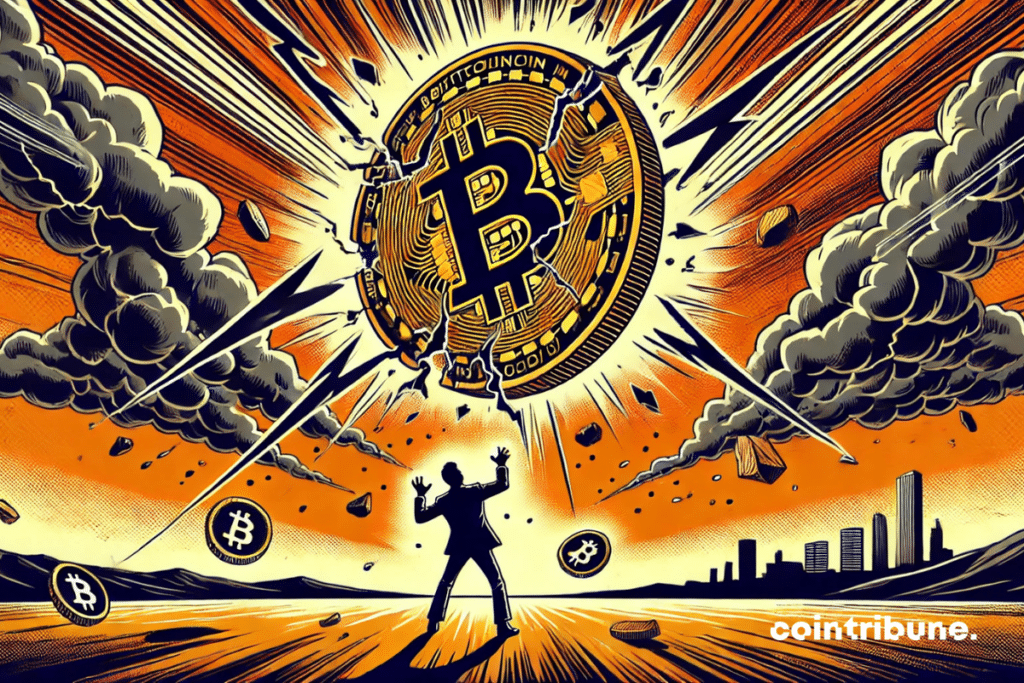Bitcoin Apocalypse: Expert Insights on the Future of Cryptocurrency Amid

In this discussion, we’ll delve into the concept of a Bitcoin apocalypse—what it means for the future of cryptocurrency, and the expert insights that may shed light on Bitcoin’s role in a global crisis. By exploring economic theories, real-world case studies, and expert opinions, we’ll unpack what could happen to Bitcoin in the face of an uncertain future.
1. Bitcoin’s Resilience and the Concept of “Digital Gold”

One of the core arguments in favor of Bitcoin, particularly in times of global financial turmoil, is its potential to act as “digital gold”—a store of value that can withstand inflation and the devaluation of traditional currencies. As central banks print more money to address crises like economic recessions or pandemics, Bitcoin has often been viewed as an asset that is decentralized, with a fixed supply of 21 million coins, making it resistant to the same inflationary pressures faced by fiat currencies.
Expert Insight: “Bitcoin is the Anti-Fiat Asset”
Many cryptocurrency advocates, such as Mike Novogratz, founder of Galaxy Digital, argue that Bitcoin’s limited supply is what makes it an attractive hedge against inflation. In an interview with CNBC, Novogratz stated, “Bitcoin is a hedge against central banks and government printing money… it’s really an asset that doesn’t correlate to traditional markets.” In this sense, Bitcoin’s decentralized nature and digital scarcity make it an attractive alternative to government-issued currencies that are susceptible to inflation during times of crisis.
However, experts acknowledge that Bitcoin’s resilience is not absolute. While Bitcoin’s price has surged during certain crises (such as the 2020 COVID-19 pandemic), its value has also experienced extreme volatility, particularly during broader market crashes. This introduces a critical question: Will Bitcoin’s role as a safe haven hold true in an apocalyptic scenario? Or will its volatility hinder its potential to be a stable store of value?
2. The Risk of Bitcoin’s Volatility in a Global Crisis
While Bitcoin is often hailed for its potential to thrive amid financial instability, its volatility is one of the main factors that experts believe could limit its appeal during a major crisis. Bitcoin’s price can fluctuate by thousands of dollars in a matter of days, making it a risky asset during times when investors typically seek stability. In the face of economic turmoil, many people may not want to take on the risk of holding an asset that can see drastic price swings.
Expert Insight: “Volatility May Hinder Bitcoin’s Role in a Crisis”
Mohamed El-Erian, chief economic advisor at Allianz, has cautioned that Bitcoin’s volatility could undermine its effectiveness as a safe-haven asset. In an interview with Bloomberg, El-Erian explained, “During a crisis, investors prioritize stability and liquidity over growth. Bitcoin’s price volatility can make it a poor substitute for more stable assets like gold or government bonds.” According to El-Erian and other financial experts, Bitcoin’s inherent price fluctuations could make it less reliable as a store of value when people are looking for secure, low-risk investments.
Moreover, Bitcoin’s lack of widespread adoption as a mainstream payment method might also hinder its appeal during a global crisis. While Bitcoin is growing in popularity, it is still not widely accepted for everyday transactions, which could limit its use as a global currency replacement during times of economic disruption.
3. The Role of Central Banks and Regulatory Pressure
A key concern for the future of Bitcoin during a global crisis is the response of central banks and governments. The possibility of regulation or even bans on cryptocurrency could have a profound effect on Bitcoin’s role in a global crisis. If governments view Bitcoin as a threat to the stability of their financial systems, they may take steps to limit its use, much like they have done with other alternative financial systems in the past.
Expert Insight: “Governments Will React to Bitcoin’s Disruption”
Christine Lagarde, President of the European Central Bank, has been outspoken in her criticism of Bitcoin, calling it a “highly speculative asset.” In a 2021 interview, she stated, “It’s not a currency. It’s more of an asset for speculation.” Lagarde’s statement reflects a growing concern that governments will likely regulate cryptocurrencies if they perceive them as a threat to the stability of the traditional financial system. China, for example, has already cracked down on Bitcoin mining and banned cryptocurrency transactions, signaling the potential for further regulatory action worldwide.
If governments move to impose stricter regulations or bans on cryptocurrencies during a crisis, Bitcoin could face significant challenges in maintaining its value. The uncertainty surrounding regulation could undermine investor confidence, leading to a potential decline in value. For Bitcoin to truly thrive in an apocalyptic financial scenario, it would need to navigate complex geopolitical tensions and government policies aimed at curbing its influence.
4. Bitcoin as a Tool for Financial Inclusion
While Bitcoin faces several risks during times of crisis, it also holds significant promise as a tool for financial inclusion. In regions where access to traditional banking systems is limited, Bitcoin offers a decentralized alternative that can provide financial services to individuals who are unbanked or underbanked. This has become particularly relevant in developing countries or crisis-stricken regions, where citizens may not trust the stability of their local currencies or banks.
Expert Insight: “Bitcoin Can Empower the Unbanked”
Elizabeth Rossiello, CEO of AZA Finance, a financial technology company in Africa, has argued that Bitcoin could be a “game-changer” for regions where financial infrastructure is lacking. In a 2020 interview with Forbes, Rossiello explained, “Cryptocurrency, including Bitcoin, allows people to store wealth securely and conduct transactions without the need for traditional financial institutions. This could be invaluable in regions experiencing political instability or economic collapse.”
If Bitcoin can maintain its appeal as a decentralized alternative, it could serve as a lifeline for individuals in crisis situations who are looking for a way to preserve their wealth and conduct transactions without relying on unstable local currencies or banks. In this sense, Bitcoin’s potential during an apocalypse might not lie in its ability to replace traditional money, but in its capacity to empower people in regions where financial systems break down.
5. The Future of Bitcoin in a Crisis: A Balanced Outlook
While Bitcoin offers exciting possibilities for the future, its role in a global crisis remains uncertain. Experts agree that Bitcoin’s volatility, regulatory risks, and limited adoption as a global payment system are significant challenges that must be addressed before it can fully realize its potential as a crisis-proof asset.
However, some experts believe that Bitcoin could evolve into a more stable and reliable asset over time. As the cryptocurrency market matures and becomes more widely adopted, Bitcoin may become less volatile, more accepted as a form of payment, and potentially more regulated. With the right infrastructure, education, and policy frameworks, Bitcoin could one day play a central role in the global financial system, even amid a crisis.
In the near term, however, it’s likely that Bitcoin will continue to be a high-risk investment that is best suited for those who are willing to take on volatility. Its future amid global turmoil will largely depend on how governments, regulators, and market participants respond to its growing influence.
Conclusion: Is Bitcoin the Answer to Financial Crises?
Bitcoin is undoubtedly a powerful innovation with the potential to reshape finance. Its decentralized nature, limited supply, and ability to offer financial services to the unbanked make it an attractive option in times of crisis. However, Bitcoin’s volatility, regulatory hurdles, and uncertain adoption make it a risky asset for those seeking stability in a global crisis.
The Bitcoin apocalypse is not just a theoretical concept—it’s a question that continues to captivate economists, investors, and policymakers. While Bitcoin has the potential to be a safe haven in times of financial uncertainty, its future is deeply tied to how the world addresses its risks and challenges. Whether it will become a global store of value or remain a speculative asset is yet to be seen, but one thing is clear: Bitcoin is here to stay, and its role in the future of global finance will continue to evolve.
Read Also About: Oklahoma City Bombing
Oklahoma City remains one of the deadliest acts of domestic terrorism in U.S. history. The bombing shocked the nation and highlighted the growing threat of homegrown extremism. In this post, we’ll explore the events surrounding that tragic day, the aftermath, and how the bombing led to significant changes in U.S. policies on counterterrorism.






